
Educational robots are the best platforms for children to cultivate the abilities for success and improve scientific and technological literacy through fun activities.
As the global pioneer and leader in educational robots, Abilix®, founded in 1996, sets ‘helping children succeed in life’as its ultimate mission.
Children 5-16 years of age are welcome to our 126 stores across the world to “play with Abilix and practice to improve the abilities for success”!
The Abilix home standard course system is the world’s only eight-stage ability training course system using educational robots as platforms.
| Course number |
Course name | Suitable for | Platforms used in the course | WER events | Course sessions |
Course hours |
Course duration |
|---|---|---|---|---|---|---|---|
| AY1 | Ability training course (AY1) | Students from the senior year in nursery school to K3 |
Brick robots, modular robots | Brick robot event (I) | 32 | 48 | One Year |
| AY2 | Ability training course (AY2) | AY1 graduates | Brick robots, mobile robots, Humanoid robots |
Brick robot event (II)mobile robot event (I) | 32 | 64 | One Year |
| AY3 | Ability training course (AY3) | AY2 graduates | Brick robots, humanoid robots | Brick robot event (III)flying robot event (I) | 32 | 64 | One Year |
| AY4 | Ability training course (AY4) | AY3 graduates | Humanoid robots, flying robots | Brick robot event (IV)humanoid robot event (I) | 32 | 64 | One Year |
| AO1 | Ability training course (AO1) | Students in K4-K9 | Brick robots, modular robots | Brick robot event (I) | 32 | 64 | One Year |
| AO2 | Ability training course (AO2) | AO1 graduates | Brick robots, mobile robots, humanoid robots |
Brick robot event (II)mobile robot event (I) | 32 | 64 | One Year |
| AO3 | Ability training course (AO3) | AO2 graduates | Brick robots, humanoid robots | Brick robot event (III)flying robot event (I) | 32 | 64 | One Year |
| AO4 | Ability training course (AO4) | AO3 graduates | Humanoid robots, flying robots | Brick robot event (IV)humoid robot event (I) | 32 | 64 | One Year |
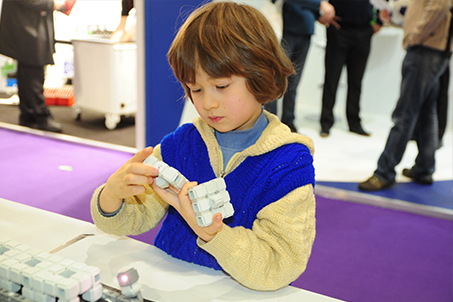
The “Ability training course AY1”is an introductory course in the Abilix robot course series. The purpose of the course is to help students understand the most fundamental structures and simple mechanics associated with robots. Children will conduct scientific inquiry on technical matters such as the functions of the structures (triangle, parallelogram, etc.), simple mechanical principles (lever, gear, pulley, worm, and rack, etc.), movements caused by forces (gravity, elasticity, etc.). Through the design and execution of a series of projects, children acquire an introductory knowledge about robots, while enjoying the h hands-on experience. This course provides the students with the opportunity to simultaneously study many types of robots, including the humanoid/mobile/flying robots. This enables them to expand their scope of knowledge, cultivate good habits of being keenly observant in everyday life and intelligent technologies, spotting problems, and thinking actively.
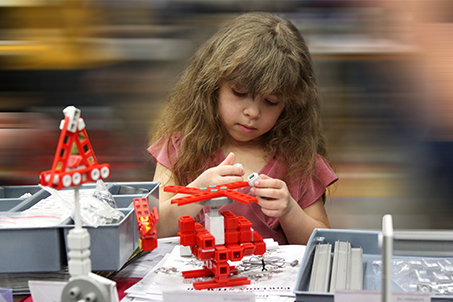
The “Ability training course AY2”is an introductory course for sensors and programming in the Abilix robot course series. It teaches the preliminary applications of robot structures and driving devices. The purpose of this course is to help students understand the commonly used sensors (e.g., the touch sensors, photosensitive sensors, magnetic sensors, flame sensors, sound sensors, and temperature sensors, etc.), and to master their basic principles and functional features. This learning is undertaken through the making of works of science and practical technologies, such as washing machines, intelligent doghouses, photosensitive alarm clocks, vehicles used to guide the blind, sound-controlled lamps, and thermostatic boxes, etc. Children will also learn programming skills such as the programming of sequential structures, branch judgment structures, and cycle structures. This course cultivates student’s logical reasoning ability and the ability to apply learned knowledge to real life.
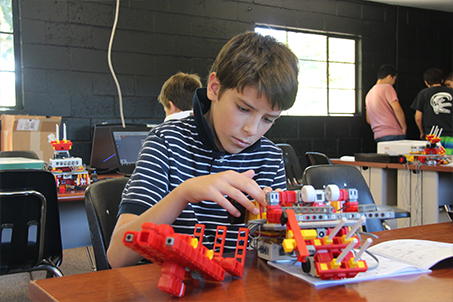
The “Ability training course AY3”is a basic course for sensors and programming, includingthe basic structures for simple robots, the functions of grey sensors, and the design and writing of programs for intelligent control. The purpose of this course is to help students understand program flow diagrams, analyze program functions, and provide training on the design ideas and methods of programming, through a series of lively and interesting robot competition events that teach students to creatively solve practical problems.
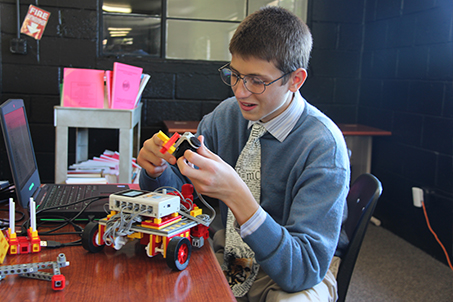
The “Ability training course AY4”is a series of applied engineering practice projects along themes associated with industrial manufacturing. The purpose of this course is to help students understand the operational principles of the commonly seen equipment used in industrial manufacturing, learn the principles and methods of multi-degrees of freedom and multi axis linkage control, and to master the control theory and programming of the complex control systems. The course also includes advanced lessons on the operation and control of flying robots. These lessons teach the students in-depth knowledge about the structures of unmanned multi-rotor aircrafts, rectangular coordinate operational and control principles, indoor positioning techniques, multi sensor application principles, as well as flight principles and control methods for operating flying robots using the self-developed safety technologies. Beyond this, they also teach the students how to operate and control complex mission scenarios for flying robots through complex action module programming.
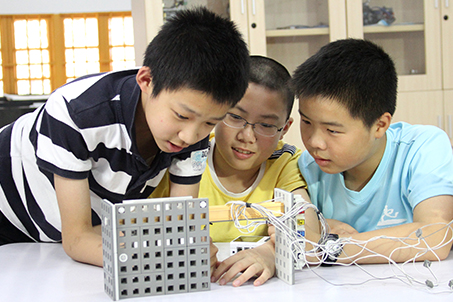
The “Ability training course AO1” is an introductory course in the Abilix robot course series. The purpose of the course is to help students understand the most fundamental structures and simple mechanics associated with robots. Students will conduct scientific inquiry on technical matters such as the functions of the structures (triangle,parallelogram, etc.), simple mechanical principles (lever, gear, pulley, worm, and rack, etc.), movements caused by forces (gravity, elasticity, etc.). Through the design and execution of a series of projects, students acquire an introductory knowledge of robots, while enjoying the hands-on experience. This course provides the students with the opportunity to simultaneously study many types of robots such as the humanoid/mobile/flying robots, etc.,so as to help them expand their scope of knowledge, cultivate good habits of being keen on observing everyday life and intelligent technologies, spotting problems, and thinking actively.
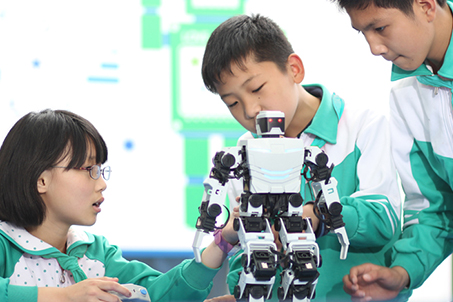
The “Ability training course AO2” is an introductory course for sensors and programming in the Abilix robot course series. It teaches the preliminary applications of robot structures and driving devices. The purpose of this course is to help students understand commonly-used sensors such as the touch sensors, photosensitive sensors,magnetic sensors, flame sensors, sound sensors, and temperature sensors, etc. Students will master the basic principles and functional features of sensors, through the making of works of science and practical technologies, such as washing machines, intelligent doghouses, photosensitive alarm clocks, vehicles used to guide the blind, sound controlled lamps, and thermostatic boxes, etc. This course teachesprogramming skills, such as the programming of sequential structures, branch judgment structures, and cycle structures, and cultivates student’s logical reasoning ability and the ability to apply learned knowledge to real life.
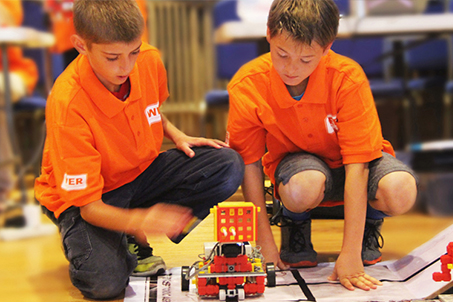
The “Ability training course AO3” is a basic course for sensors and programming, includingbasic structures for simple robots, functions of grey sensors, and the design and writing of the programs for intelligent control. The purpose of this course is to help students understand program flow diagrams, analyse program functions, and obtain instruction on the design ideas and methods of programming, through a series of lively and interesting robot competition events that are designed to teach students to creatively solve practical problems.
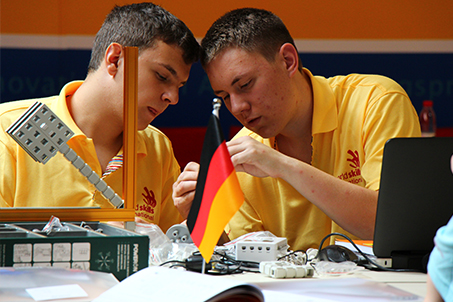
The “Ability training course AO4” is a series of applied engineering practice projects with themes associated with industrial manufacturing. The purpose of this course is to help students understand the operational principles of the commonly seen equipment used in industrial manufacturing. Students will learn the principles and methods of multi-degrees of freedom and multi-axis linkage control, and master the control theory and programming of the complex control systems. The course also includes advanced lessons on the operation and control of flying robots. These lessons provide students with in-depth knowledge about the structures of unmanned multi-rotor aircrafts, rectangular coordinate operational and control principles, indoor positioning techniques, multi-sensor application principles, as well as flight principles and control methods for operating flying robots using the self-developed safety technologies. Beyond this, students learn to operate and control complex mission scenarios for flying robots through complex action module programming.
Educational robotics was co-establishedin 1996 by the renowned American educator,Jake Mendelssohn, and the founder of Abilix doctor, Yun Weimin. The three major foundations of educational theory for educational robotics are constructivism, multiple intelligence, and successful intelligence.
The three major foundations of educational theory, multiple intelligence, constructivism and successful ability, form the framework shown in the figure. Successful ability can be regarded as the cognitive subject’s ability to interact with the social environment based on the foundations of multiple intelligences and the constructed knowledge. There are extremely close links between the three theories.
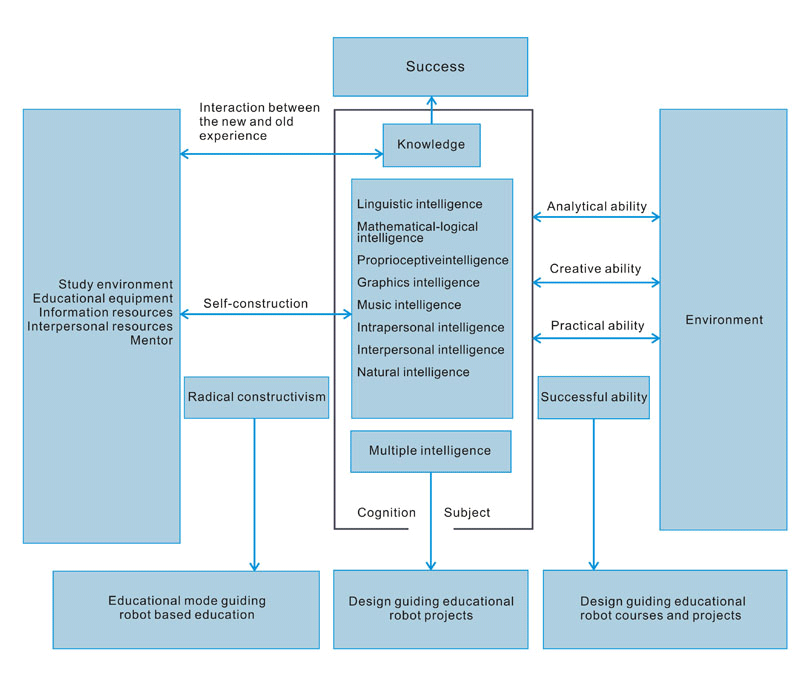
全职老师,专业认证
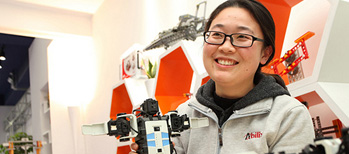
我们招募热衷青少年教育的优秀机器人教师,他们均持有WER全国教练员资格认证,并在能力风暴机器人活动中心持续接受专业的职业培训,旨在确保卓越的教学质量。
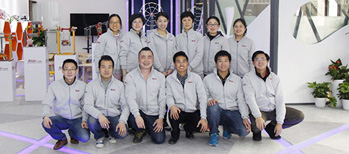
能力风暴机器人活动中心的任课教师由集团总部统一招聘,每年,申请者必须通过层层选拔与培训才能成功到各个校区任教。

ABILIX home与清华大学合作,邀请机器人领域的专业教授担任机器人课程设计和WER竞赛课程顾问,并由十年以上教学经验的一线教师组成团队,致力于能力风暴课程体系与价值的研究。

在能力训练课程中,试错是主要的学习方式,鼓励犯错,慢慢地,孩子越来越大胆,越来越高兴,项目也越做越成功。未来人生一定面对许多未知的难题,这么小就能完成极富挑战的机器人项目,人生的难题也一定能解决。

能力训练课程中,我最喜欢看到孩子们越来越主动,越来越会自我激励自己,遇到困难,不放弃,能坚持,一次次调试,最后成功,孩子们脸上的笑容是最美的花。

每堂课带孩子用头脑风暴的方法去创意项目方案,常常为孩子们的创造力所感染,许多想法我也想不出来。看来孩子们的创造力是与生俱来,后天的学校教育不小心把它禁锢了。

有了自己的新想法,孩子们有很强的欲望马上实现,有的孩子失败了,下课也不走,还哭,具有这样的精神走人生,一定精彩。
Abilix is WER's Global Sponsor

WER, initiated and hosted by Federation of World Educational Robot, is an international robot competition for young students aged from 6 to 18. Each year, more than 300,000 players will take part in all levels of WER competions.
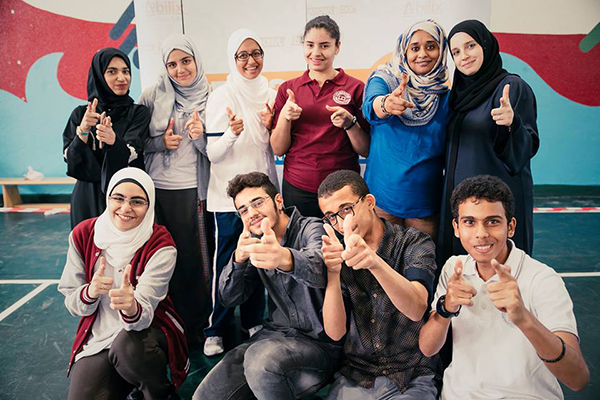
WER 2016 Championship will be held in Shanghai in Nov. 2016. It is a competition for educational robots. This championship will be hosted by Federation of World Educational Robot. The player teams are recommended and selected by WER branches in over 30 countries. WER winners from all countries and players collect in Shanghai to present a WER gala to the world.

WER 2016 US Open will be held in Los Angeles from August 13 to 14, 2016. The organizing committee of WER China will organize Chinese robot player team to attend WER 2016 US Open. Chinese robot player team will compete with US player team and other foreign teams as well in the same competition, and will exchange cultures about technical education.

WER 2016 US Open will be held in Vancouver from August 6 to 7, 2016. The organizing committee of WER China will organize Chinese robot player team to attend WER 2016 Canada Open. Chinese robot player team will compete with Canada player team and other countries' player teams as well in the same competition, and will exchange cultures about technical education.